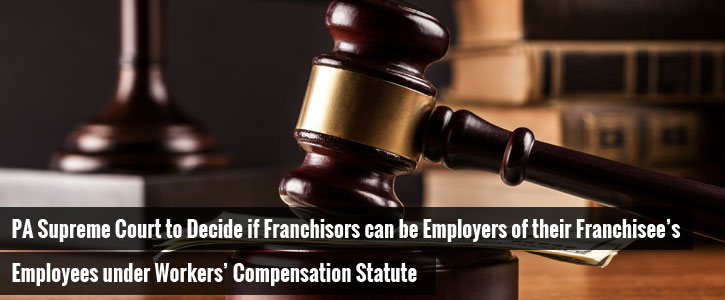PA Supreme Court to Decide if Franchisors can be Employers of their Franchisee’s Employees under Workers’ Compensation Statute

Yesterday, the Pennsylvania Supreme Court agreed to rule on a seemingly narrow issue that threatens to send ripples across the entire franchise relationship. Specifically, following an appeal of the Commonwealth Court’s decision in Saladworks, LLC v. W.C.A.B. (Gaudioso), the Court will decide whether a franchisor can ever be subject to liability as a statutory employer under Section 302(a) of the Pennsylvania Workers’ Compensation Act.
This case involved the employee of a Saladworks franchisee that was injured on the job. This employee sought workers’ compensation benefits from both the franchisee and franchisor, but the franchisee did not have proper workers’ compensation coverage. Under Pennsylvania law, an employee who is unable to recover from their direct employer can seek benefits from a statutory employer who meets the standard set forth in Section 302(a) of the Pennsylvania Workers’ Compensation Act. The Workers’ Compensation Judge initially determined that Saladworks was not the employer of its franchisee’s employee, but this decision was reversed by the Workers’ Compensation Appeal Board.
Saladworks appealed to the Commonwealth Court, who reversed the decision of the Workers’ Compensation Appeal Board and found that Saladworks was not a statutory employer under Section 302(a). The decision turned on specific language in the statute, under which Saladworks would be deemed a statutory employer if the work performed by franchisees was a “regular or recurrent part of the business, operation, profession, or trade” of Saladworks. The Workers’ Compensation Appeal Board found that Saladworks was primarily in the business of selling salads and other food products, and therefore was a statutory employer. The Commonwealth Court found that Saladworks was primarily in the business of selling franchises, not salads, and therefore was not a statutory employer.
I am surprised to hear that the Pennsylvania Supreme Court is willing to take this case. In my opinion, this case was correctly decided by the Commonwealth Court on settled law and a solid understanding of the franchise model. While franchisors should take note of this case as a reminder to ensure that their franchisees maintain required insurance, a franchisor should not be considered as the statutory employer of its franchisee’s employees.
As accurately stated by the Commonwealth Court, franchisors are in the business of selling franchises and licensing their proprietary marks and system to independent franchisees, who carry out the actual underlying business – in this case, selling salads. Although the Supreme Court’s ruling will only apply to a very narrow set of circumstances (specifically, when its franchisee isn’t carrying workers’ compensation insurance), these types of decisions have the potential to eviscerate the entire franchise model. The franchising industry, which accounts for nearly 10 million American jobs, is predicated upon the status of the franchisee as an independent business owner with control over the day-to-day operations of their franchise. Allowing a franchisor to be classified as an employer of its franchisee’s employees blurs the line between the two and will force franchisors to grow increasingly involved in franchisee operations, threatening their independent status.
The Commonwealth Court recognized this fact when they reversed the decision of the Worker’s Compensation Appeal Board. I’m hopeful that the Pennsylvania Supreme Court will also reach the correct decision and determine that a franchisor can never be considered a statutory employer under Section 302(a) of the Pennsylvania Workers’ Compensation Act.
Back



